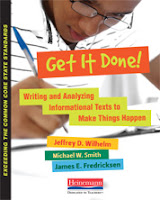As part of the Boise State Writing Project, I've been reading a lot of great books this summer that have been impacting my thinking about learning and teaching. Then a couple of weeks ago I found this fun blog post where a number of different teachers were sharing their Top 10 picture books. Many matched books on my list, but other titles were new and I will be checking them out. It also got me thinking. What would be on my Top 10 list of professional books or nonfiction books? So here you go. The Top 10 Professional Books that have had an impact on my teaching...for now, but in no particular order. Hopefully you'll find something for your shelf.
Stay tuned for the Top 10 Nonfiction List!
Angie
Revisit, Reflect, Retell by Linda Hoyt
This book is FULL of great strategies to use with kids of all ages. I use many of them in CCSS trainings with adults. They are simple and powerful ways to support thinking, reading, writing, listening and speaking. I'm on my second addition of this book and it was worth upgrading. I use this resource all the time.
This book has changed my thinking about how we discuss the crafting of writing with children. It focuses on the use of high quality nonfiction texts as mentors of what quality writing looks like. It puts students in a place where they not only listen to, read or think about the content, but they are paying attention to the author's craft and considering how they can use these same ideas in their writing. I love this idea because often as teachers we are either insecure about our own writing or we don't take the time to write a piece that we can use in instruction. Plus, this book is full of titles for amazing lessons that support the CCSS in writing.
Strategies the Work by Stephanie Harvey and Anne Goudvis
This book has really influenced my thinking about getting kids to be strategic readers. They have so many great ideas that help scaffold kids thinking about fiction and nonfiction. They also do a great job of modeling their thinking so teachers can visualize what lessons and conversations might look like in the classroom. There are also plenty of new children's books on my shelves because of recommendations from this book.
Get It Done!: Writing and Analyzing Informational Text to Make Things Happen by Jeff Wilhelm, Michael Smith and Jim Fredricksen
What a privilege to know these authors! Great guys. Smart guys! I'm learning so much from their series of books that look at informational, persuasive and narrative writing with kids.

Engaging Readers and Writers with Inquiry by Jeff Wilhelm
I'm becoming more and more convinced that real and deep differentiation for all kids happens through inquiry. A big, engaging question has room for every kid to question, research, read, write and grow. They can each join at varying degrees of competence and with different levels of text complexity.
This book really changed my thinking about the way kids learn to have control over spelling patterns and rules. These authors have developed an assessment that is really informative about students' instructional levels and their suggested lessons and activities have made a big difference where they have been strategically applied with kids.
Seven Strategies of Assessment for Learning by Jan Chappius
Rick Stiggins is a rock star. I'm the president of his fan club. :-) Just to be fair, this book is written by Jan Chappius, a consultant from Rick Stiggins camp. It should be read and studied and reread by every undergraduate going into education. The principles in this book (a little easier to access than Stiggins book) are critical for every competent teacher to understand and apply to their classrooms. The ideas about formative and summative found me 10 years into my career. Never too late!
This book gets at the heart of learning and what I wish every teacher, team and school was about. The four PLC questions have stuck with me:
1. What is it we want kids to learn?
2. How will we know they have learned it?
3. What will we do if they don't learn it?
4. What will we do if they have already learned it?
Such simple question packed with so much deep thinking and hard work! I think about these questions often when I'm working with kids and when I work with teams. Maybe I've bugged you with a few. :-)
I got to hear this man speak a few years ago right after I had finished this book. It was so impressive to hear his straight talk about school cultures and how to begin making learning centered changes when staff are resistant. Now, I have to admit, I was NOT comfortable having other teachers seeing me read this book. The title makes it look like teachers are difficult. Muhammad makes the case that many teachers who resist change have good reason to resist. In fact, he gives a lot of practical advice for helping figure out what different staff need to move forward with change. I need to reread this one. Who am I kidding? I need to reread all of them.

The Differentiated School, by Tomlinson, Brimijion, Narvaez
Carol Ann Tomlinson has changed the way I think about learning and teaching in schools, but this book really helped form my thinking about how we service kids, especially with your program. This was a pivotal book in instigating changes to gifted services in our district.







